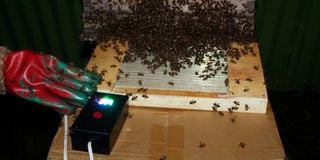Bee venom that heals and brings a tidy income

A bee venom collector uses an instrument to irritate bees in a bee hive in Utawala, Nairobi County.
What you need to know:
- Bee venom contains both anti-inflammatory and inflammatory compounds, including enzymes, sugars, minerals, and amino acids.
- The demand for bee venom is set to go higher as a result of the increasing demand for natural and organic cosmetic products
Beekeeping is one of the ancient forms of economic activity, yet still an under-explored venture.
Most people get into the beekeeping business to sell honey as the only end product, ignoring the lucrative earnings that come with it.
This practice is however getting phased out as a result of research, which has found high-value products, not only for income generation but for human health.
One such product is bee venom, which is a high-value product due to its uses.
Bee venom is a colourless, acidic liquid that is produced by honeybees and is a naturally occurring toxin. Bees excrete it through their stingers into a target when they feel threatened.
It contains both anti-inflammatory and inflammatory compounds, including enzymes, sugars, minerals, and amino acids.
Savannah Honey Founder Kyalo Mutua notes that most Kenyans rely on imports for some of the products such as the venom honey and bee venom creams.
The high demand for this product continues to rise as more people continue to learn of the health benefits that include anti-inflammatory properties, immune system boosting, and potential antibacterial properties.
Mutua notes that unlike in the past years when Kenyans relied on the imported products, more researchers are now providing directions and the efforts to make bee venom locally available, are now bearing fruits.
“We now have these products locally, and we are providing solutions to these needs at very low cost compared to importing the products,” he adds.
He notes that the discovery of these products aside from honey is a result of thorough research and the urge to make them affordable to Kenyans.
According to Mutua, despite the high potential for the farmers to earn from the venture, most people relied on imports, which most of the time took long periods before delivery.
“Lack of information remains the biggest challenge, yet this is a venture with a high potential to earn the farmers a good fortune,” he says.
As one of the ventures, Mutua has also been working with local farmers to install venom harvesters in their beehives, which the company buys and uses to manufacture the products for both local and export markets.
“We also get to train the farmers on how to do the simple tasks on their own, and how to handle the commodity so as to maintain standards and best quality in the process,” adds Mutua.

Savannah Honey founder Kyalo Mutua displays some of the beauty products made from been venom on February 8, 2024.
He says the process of extraction involves the use of a venom collector. This is a device that uses electrical sensation to stimulate the bees to release venom without causing harm.
“The process of collecting bee venom can be undertaken seamlessly into existing bee farming practices. This therefore becomes an added advantage to the already existing benefits,” he adds.
Some of the high-value products also include the venom honey that is already in the Kenyan market retailing at Sh4,800 for a 500 grammes package.
The same quantity of the venom honey goes for Sh12,000 when imported.
“Our prices are less than half that of the import market, yet we maintain high-quality standards. We aim to reach more Kenyans as we seek to promote more healthy living standards,” adds Mutua.
He notes that although the company started making the products in 2019, the biggest task was to create awareness of their existence in the Kenya market.788
The bees are gently stimulated by the collector, causing them to discharge small amounts of venom while safeguarding their delicate bodies.
Taking these precautionary measures, protects the bees’ health and safety while allowing you to collect venom, which is the raw material for several products ethically and responsibly.
Mutua notes that it is possible to extract the necessary amount of bee venom while keeping the hive healthy by regulating the collector’s intensity and duration.
“This level of control ensures there is consistency and maximises the beneficial effect of the venom gathered. The venom collector has improved safety features to offer a safe and enjoyable experience,” he adds.
The collection has a barrier between the bees and the operator to prevent unintentional contact. Additionally, the collector is intended to reduce stress on the bees, increasing their overall health and minimising any potential injury during the venom collection procedure.
“This long-term technique ensures bees’ long-term health and viability while reaping the benefits of their venom,” he says.
Traditionally, people considered bee stings as a way of improving one's immunity, and therefore beekeepers did not protect themselves from stings during honey harvesting.
According to Mutua, the demand for bee venom is set to go higher as a result of the increasing demand for natural and organic cosmetic products.
Other high-value products that Savannah Honey sells include bee pollen, propolis, wax and royal jelly.





